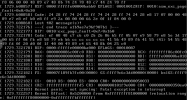I've been pulling my hair out for the past 2 months with my pfSense VM either hard crashing or temporarily losing access to the network card (the latter self corrects in a couple minutes). Also have a second windows VM that has crashed; just not frequently.
I just found this discussion.
I flattened and rebuilt the pfSense install this morning. I re-installed running it as UEFI bios, q35 machine and bridge network (previously was seabios and default machine; switched to see if it mattered). PFSense is set-up very generic almost entirely running off the set-up wizard and I just crashed again after 4 hours. My box is an HUNSN RJ03 with the N5105 CPU with 32g ram (now 16 as I pulled one module as part of debugging)
After crashing the CPU typically pegs to 100%. It looks like it might of went through a reboot after crashing and then had a kernel panic. This is the end of the logs:
kernel trap 12 with interrupts disabled
Fatal trap 12: page fault while in kernel mode
cpuid = 0; apic id = 00
fault virtual address = 0xffffffff8135a848
fault code = supervisor write data, protection violation
instruction pointer = 0x20:0xffffffff80da98bd
stack pointer = 0x28:0xfffffe0025782980
frame pointer = 0x28:0xfffffe00257829e0
code segment = base 0x0, limit 0xfffff, type 0x1b
= DPL 0, pres 1, long 1, def32 0, gran 1
processor eflags = resume, IOPL = 0
current process = 11 (idle: cpu0)
trap number = 12
kernel trap 12 with interrupts disabled
Fatal trap 12: page fault while in kernel mode
cpuid = 2; apic id = 02
fault virtual address = 0x1
fault code = supervisor write data, page not present
instruction pointer = 0x20:0xffffffff8135a840
stack pointer = 0x28:0xfffffe0000c83c00
frame pointer = 0x28:0xfffffe00005fa4f0
code segment = base 0x0, limit 0xfffff, type 0x1b
= DPL 0, pres 1, long 1, def32 0, gran 1
processor eflags = resume, IOPL = 0
current process = 12 (irq260: virtio_pci1)
trap number = 12
timeout stopping cpus
panic: page fault
cpuid = 0
time = 1667430428
KDB: enter: panic
Is this most likely the instability everyone is talking about? I am fully updated with the latest non-subscription install.
And is there a way to write a script that detects when the pfSense VM crashes, kills the VM and restarts it?
Thanks!



